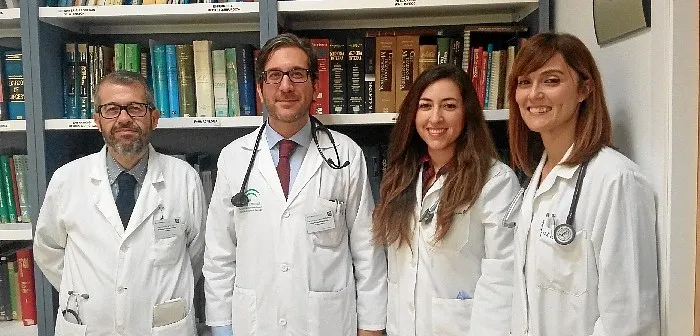The Spanish Society of Internal Medicine (SEMI) has once again recognized the study presented by professionals of the Internal Medicine Unit of the University Hospital Complex of Huelva and the Health Center of the Molino de la Vega, of the Huelva-Costa district, in relation to the influence of the new treatments in those patients with type II diabetes mellitus and a high overweight, within the XI Congress of Diabetes and Obesity organized by the Spanish Society of Internal Medicine.
This national event dedicated to clinical cases related to diabetes control and which showThe purpose of offering comprehensive care, taking into account that they usually present other pathologies and added complications, always with the aim of favoring their recovery and, above all, improving their quality of life.
Diabetes is a metabolic disease that affects 13.8% of the population throughout the national territory and is on the rise due to the current lifestyle.If this is added that 40% of patients maintain glycemic control in inappropriate blood and that 80% of them have overweight or are obese, in addition to suffering, in 60% of cases, a high blood pressure,The attention of these patients is essential through a feasible and individualized plan that takes into account all associated pathologies.
In this sense, the study conducted by the specialist in Internal Medicine of the Hospital Complex, Juan Ignacio Ramos-Clemente, together with the doctors Marta Sáenz de Tejada, Dolores María Díaz, Juan Manuel Domínguez and Elena Sánchez, advocates for a broad approach byof a multidisciplinary team and from the coordination of the two healthcare levels, primary care and specialized care, for the definition of diabetic patient treatment.
A therapeutic response that, thanks to active listening based on a good medical-patient relationship, takes into account the patient's personal needs and conditions, which adapts to its peculiarities and that, individually, offers an effective response and an effective response andIt allows him to make his own health responsible encouraging him to adopt new habits, for better control of his illness and a good quality of life.
Thanks to this strategy and pharmacological treatment, the group of patients approached in this study, who presented obesity and poor control of their diabetes, saw in three months the control of their disease with a reduction in blood glucose values, in addition, in additionof other positive factors associated with therapy, such as weight reduction and better hypertension control.As a consequence, the ability to exercise and the risk of ten years of myocardium, one of the complications of this disease was reduced.
Type II diabetes mellitus and obesity are considered the two great pandemics of the 21st century, which is not only affecting the population of the developed world, but is extending alarmingly in developing countries.Obesity is considered the main responsible for the increase in the prevalence of this type of diabetes, with the consequent increase in complications derived from it, such as ischemic heart disease, strokes and neuropathies.In addition, it is directly related to the appearance of numerous diseases that affect the entire peripheral arterial system, generating damage both in the kidney and the retina, among many others.
The obesity group and diabetes ofThe Spanish Society of Internal Medicine wanted to celebrate the XI Scientific Meeting, in whose program the presentation and debate of cases is inserted, with which it is intended to emphasize the work done in the health centers, so it is structured in a formof clinical cases communication.With this type of methodology, the analysis and subsequent comment on the protagonist pathology in each case is encouraged, favoring the exchange of information such as learning formula and the update of knowledge based on specific situations and patients.
The twenty best works in Spain that have been presented in Congress have been integrated into a practical book, which is edited by the Spanish Society of Internal Medicine and intends to offer an overview of certain therapeutic approaches with a clearly pedagogical intentionand analysis that updates and completes the training of specialists.
There are many studies carried out nationally and internationally in recent years that have directly related obesity and the appearance or poor control of type II diabetes mellitus.The adoption of healthier living habits in which a balanced diet is maintained regularly and physical exercise is incorporated into the daily routine is a fundamental preventive measure, not only to avoid excess weight with all the complications of health thatIt entails, but also for the approach of diabetes and other diseases that usually appear associated, such as hypertension or metabolic syndrome.


